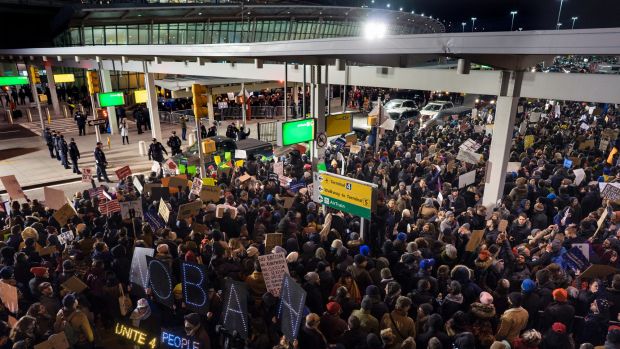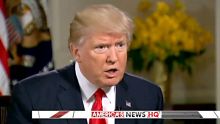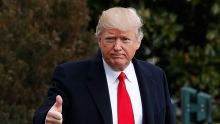Washington: There's madness in the method of this White House. But what's the objective – is it merely to give Donald Trump's critics whiplash, or is it an opening blitzkrieg of orders and insults that calculatedly defines a new 'normal,' by which the outrageous becomes just irritating?
The short answer is – Americans can't be sure. An admirer of chaos theory, Trump doesn't subscribe to the conventional political notion of staying on message, but just because he seems to suffer attention deficit disorder, doesn't mean that he doesn't have a plan.
More World News Videos
Trump blasts ruling halting immigration ban
President Trump not too pleased by a federal judge's ruling temporarily blocking his immigration ban.
Addressing the issue of a Seattle judge's decision to put the president's controversial immigration crackdown on hold, the White House took a stab at being presidential – it recalled its first statement to delete the word "outrageous."
But that was Friday. And through the weekend, even as a higher court rejected an administration appeal to have the Seattle order overturned, Trump hammered the Seattle judge James Robart – a "so-called" judge, a "ridiculous" decision and then this:
"If something happens blame him and court system. People pouring in. Bad!"
With the matter now destined to end up on the docket of the US Supreme Court, analysts and pundits are turning their minds to how Trump and the court will conduct themselves.
On Saturday night, Trump told reporters: "We'll win. For the safety of the country, we'll win."
But so far all but one of a dozen lower court judges who have run an eye over it, have found fault with Trump's executive order – and in San Francisco on Sunday, the US Court of Appeals for the Ninth Circuit rejected Trump's demand that his ban on migrants and refugees from seven Muslim-majority countries be reinstated.

The Justice Department argued that the president acted well within his constitutional authority. Blocking the order, it claimed, "immediately harms the public by thwarting enforcement of an Executive Order issued by the President, based on his national security judgment."
Arguing that it was improper for a lower court to "second guess" the president, who had an "unreviewable authority" to suspend the entry of any class of foreigners, the department claimed that the Robart decision was too broad; adding a line that it surely can't have expected the court to embrace – that Robart was in conflict with the ruling by the single judge, in Boston, who had upheld Trump's order.

The appeal court didn't buy it – instead, it ordered the parties back for further argument on Monday. But as the case works its way through the system, how compliant can Trump be expected to be? And how smart do the courts, especially the Supreme Court, have to be?
For now, despite all his bluster, Trump has not stopped the bureaucracy from working as though his order does not exist – or ordered by Robart in Seattle. But given his populist tendencies, it's no surprise that he enjoys lashing out at the judges.

But how far will he go?
"They're spoiling for a fight, and that's what populists do," Daniel P. Franklin, a professor at Georgia State University, told The Washington Post. "And I think that's the way it plays out — maybe not on this issue, but on something."

Linda Greenhouse, the Supreme Court writer for The New York Times, writes that much of the history of this period will hang on the responses of Chief Justice John Roberts, who Trump, during the presidential campaign, described as "an absolute disaster."
She writes: "When the president, aided by his inner circle and his congressional enablers, pushes through some norm-shattering order, wipes away duly promulgated regulations with the flourish of a pen or drives a truck through the wall between church and state, where will the Roberts court be?"

The signs, she writes are equivocal because of the accidents of history – Roberts was not on the court when indicative decisions were made and, in one case, he had to recuse himself from a case that might have been indicative.
Which leaves a single important case -Boumediene v. Bush in 2008, a 5-to- 4 decision by which the court held that Guantánamo detainees had a constitutional right to petition federal judges for writs of habeas corpus.
Roberts dissented, co-signing an inflammatory opinon by the late Justice Scalia that began with "America is at war with radical Islamists" and went on to warn that the decision "will almost certainly cause Americans to be killed."
And in his own, separate dissenting opinion, Roberts argued that in giving the Guantanamo detainees their rights, the American people had not won – "[Today they have lost] a bit more control over the conduct of this nation's foreign policy to unelected, politically unaccountable judges."
The history of presidents tangling with the court shows that they'll do it but only up to a point. Nixon, Clinton and Obama all spoke their minds – but in the end they did as they were told.
And the reason lies in an observation by then Chief Justice Warren Burger wrote in US v Nixon, the whole American construct of checks and balances survives because it was "the duty of the judicial department to say what the law is."
Meanwhile, another sign of buyer's remorse – this time from conservative radio talk show host Charles Sykes in Milwaukee.
Grappling with the strange contradiction between Trump and truth in the weekend, Sykes 'fesses up to his part in conditioning Trump's core supporters to reject reporting from news sites outside what he calls the conservative media ecosystem.
Describing Trump's battering of the media as "the reddest of meat for his base," Sykes writes in an op-ed in The Washington Post: "I played a role in that conditioning by hammering the mainstream media for its bias and double standards. But the price turned out to be far higher than I imagined.
The cumulative effect of the attacks was to delegitimise those outlets and essentially destroy much of the right's immunity to false information. We thought we were creating a savvier, more skeptical audience. Instead, we opened the door for President Trump, who found an audience that could be easily misled."















